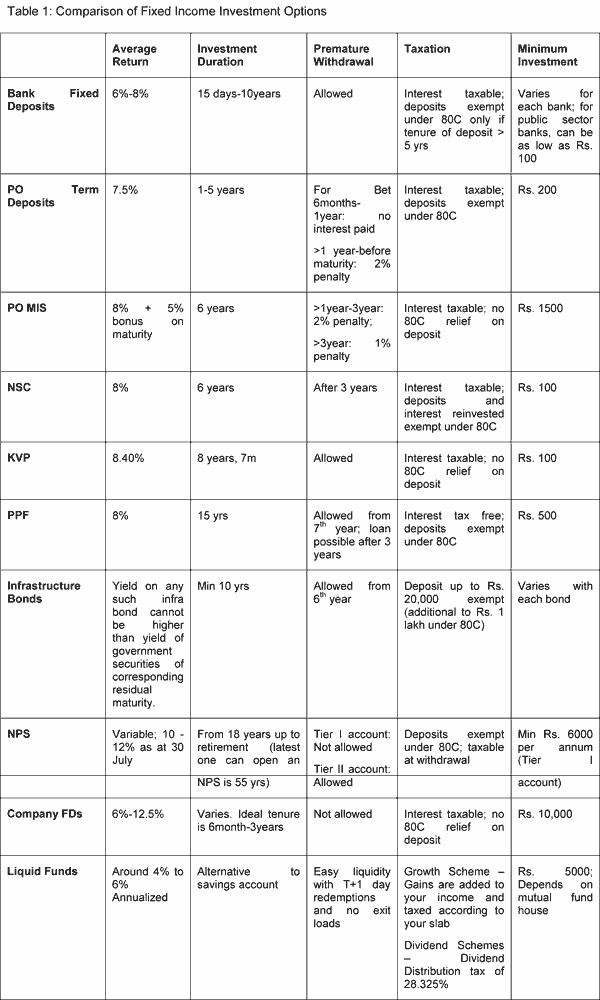Photographs: Rediff Archives Fundsupermart.com
With the economy back on track and lots of activity in the financial markets -- Sensex highs, interest rate changes -- it's probably time to take a re-look at all investment options available to you.
At Fundsupermart.com, we believe that informed financial planning is a key step towards meeting life's goals, and endeavour to provide information that will encourage investors to take a more active interest in their financial well being. In this article, we do a quick round up of the investment options available to retail investors in India.
Asset options
Broadly speaking, investment options can be seen as being of two types:
A. Fixed income
B. Market linked
Fixed income products are 'saving' oriented products whose primary aim is capital conservation. Some fixed income products also offer regular income.
Market-linked products are 'growth' oriented products, whose primary aim is capital appreciation. Almost all market-linked products carry a risk of volatility in returns as well as capital depletion; on the other hand, the returns on market linked products are generally much higher than those on fixed income products.
Disclaimer
This article is for information purpose only. This article and information do not constitute a distribution, an endorsement, an investment advice, an offer to buy or sell or the solicitation of an offer to buy or sell any securities/schemes or any other financial products /investment products mentioned in this article or an attempt to influence the opinion or behavior of the investors /recipients. Any use of the information /any investment and investment related decisions of the investors/recipients are at their sole discretion and risk. Any advice herein is made on a general basis and does not take into account the specific investment objectives of the specific person or group of persons. Opinions expressed herein are subject to change without notice.

Investment options: Choose what's right for YOU
Fixed income investments
Fixed income investments include the following:
Bank fixed deposits
Deposits in banks earn a fixed rate of interest depending on the time period for which the money is parked with the bank. The recent hike in rates by RBI has made bank deposit rates more attractive. Deposits of up to Rs 1 lakh are guaranteed by the government; larger deposits are at risk of loss of capital.
Post office term deposits
These are deposit schemes offered by the Department of Post. The deposits as well as interest earned are risk-free as they are backed by the government.
Post office monthly income schemes (MIS)
Another scheme by the Post Office, this involves depositing a lump sum and receiving monthly interest as income. The deposit and interest are risk-free as the scheme is backed by the government. The amount deposited is exempt from Wealth Tax.
National savings certificates (NSC)
These certificates are available in denominations of Rs 100, Rs 500, Rs 1,000, Rs 5,000 and Rs 10,000, and have a maturity of 6 years. This is a risk-free instrument.
Kisan Vikas Patra (KVP)
This scheme offered by the post office offers to double the investor's money in 8 years, 7 months. The amount can be re-invested on maturity. Again, this scheme is backed by the government and is risk-free.
Investment options: Choose what's right for YOU
Public Provident Funds (PPFs)
Provident Funds are primarily two -- Employee's Provident Fund, where a part of the salary (12% of basic) is deposited in the provident fund account, and Public Provident Fund, where you can directly open a PPF account and deposit savings into it. It is a risk-free option with tax benefits.
Infrastructure Bonds
In this year's budget, Finance Minister had announced that over the Rs 1 lakh that is exempt under Section 80C, a further Rs 20,000 will be exempt if invested in long term infrastructure bonds. Only bonds issued by Industrial Finance Corporation of India (IFCI), Life Insurance Corporation of India (LIC), Infrastructure Development Finance Company (IDFC) and non-banking finance companies classified as infrastructure finance companies by the RBI are eligible. These bonds are not backed by the government and carry risk of loss.
National Pension Scheme (NPS)
A pension scheme available to all citizens of India, NPS brings the advantage of having 6 professional fund managers manage your retirement savings. SBI, UTI, Reliance Capital, Kotak Mahindra, IDFC and ICICI Prudential have been authorised to manage contributions to earn the best possible returns. Within each scheme, you have the option to select the desired asset allocation -- Equity (E), Corporate Bonds (C) and Government Bonds (G). The investments are market-linked and hence are subject the relevant market risks.
Company fixed deposits
The company fixed deposits can offer higher returns than bank deposits, but carry the risk of complete loss of capital. Due diligence is required before you choose to invest in a company's fixed deposit. ICRA, CARE and FITCH issue credit ratings to all companies that issue deposits -- ideal credit rating is AAA or AA.
Liquid funds
Liquid funds are a category of mutual funds, but are used more as an alternative to the savings account -- to park funds for a short period of time from a day up to a few months. The rate of return is usually greater than bank savings accounts, but it depends on the overnight interest rates and liquidity prevailing in the money market.
Investors also tend to use Endowment Insurance Policies as retirement and annuity benefit options. We believe, though, that insurance plans fulfill a different objective and should be treated separately from your investment portfolio.
In Table 1*, we evaluate the fixed income products on the various parameters to bring out their comparative benefits:

*
Investment options: Choose what's right for YOU
Market-linked investments
Market-linked options include:
Equities
A company issues units of its equity capital (shares) to the public as a means of raising finance.
Earnings in equities come from increase in the share's value based on how well the company performs. For this very reason, equities are potentially, the highest earning, and the riskiest of all investment options. Few universal guidelines for investing in equities:
Equities are a sophisticated investor's instrument, requiring deep understanding and constant study of corporate, macroeconomic and global forces that may affect a share's value. 'Stock tips' from friends and family are not adequate replacements for this due diligence.
Understand your risk appetite well; investing in equities usually requires moderately high to aggressive risk taking appetite.
Look at this option for medium to long term -- at least 3-5 years to ensure that you do not lose out due to short term volatility in a share's price.
Never invest your entire investible portfolio into equity. Study and plan how much of your portfolio will be in equities and stick to the plan.
Mutual funds:
- Historically, retail investors have been disadvantaged where investing in market linked options is concerned:
- They do not have easy access to the instruments
- They do not have the kind of funds that easily allow bearing of risk that market linked investments entail
- They do not have the knowledge or access to data that allows them to make informed decisions about buying or selling these investments
To help retail investors overcome these obstacles and participate in the market, mutual funds were introduced. As the name indicates, mutual funds pool investments by investors and hire professional fund managers to invest these funds in the market.
Investment options: Choose what's right for YOU
Mutual funds are more like a super class of investments, catering to all types of investor needs:
- Exposure to various asset classes: Debt, equity, commodities
- Tenures: Short term, medium term, long term
- Different investment objectives: Wealth creation, tax savings, goal-oriented savings, retirement planning
Investor's risk taking appetites and return requirements -- there are schemes ranging from low-risk ratings generating fixed income, to aggressive risk ratings with potentially exponential returns.
Alternative assets
Gold: In the last five years, gold has almost doubled, making it one of the most rewarding investments. Gold is perceived to be an alternative store of value; this is why we see investors flocking to invest in gold in times of high inflation (as we have been seeing in the last year). Gold also becomes attractive whenever the dollar, the world's fiat currency, weakens. Inflation and dollar value are thus, key indicators of the value of gold globally.
Investment in Gold is possible in physical format (bars, coins or jewellery), or in demat form through Exchange Traded Funds (ETFs). ETFs purchase physical gold on behalf of their investors making this a hassle free and safer option than buying physical gold.
Market linked options would also include commodities apart from Gold, such as Silver, other industrial metals and currencies, but these are used more for trading than investment and are therefore not suitable for the average investor. Similarly, private equity is another option, which though market-linked, is meant more for sophisticated investors who can take an educated decision to invest substantially in the equity of a certain company.
Conclusion
As listed here, the Indian investor has a gamut of investment options to choose from. The fixed income options listed make for good entry points into organised and low-risk investing, whereas the market-linked options are more suitable for young investors with a certain risk taking appetite.
Mutual funds deserve special mention though as the most suitable investment option for retail investors -- a professionally managed option allowing higher returns needing minimum involvement.






Comment
article